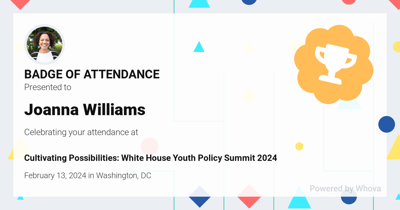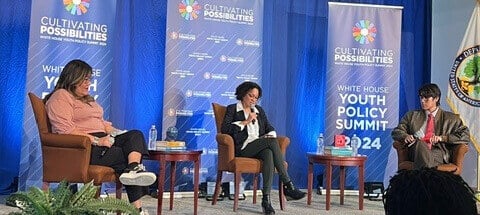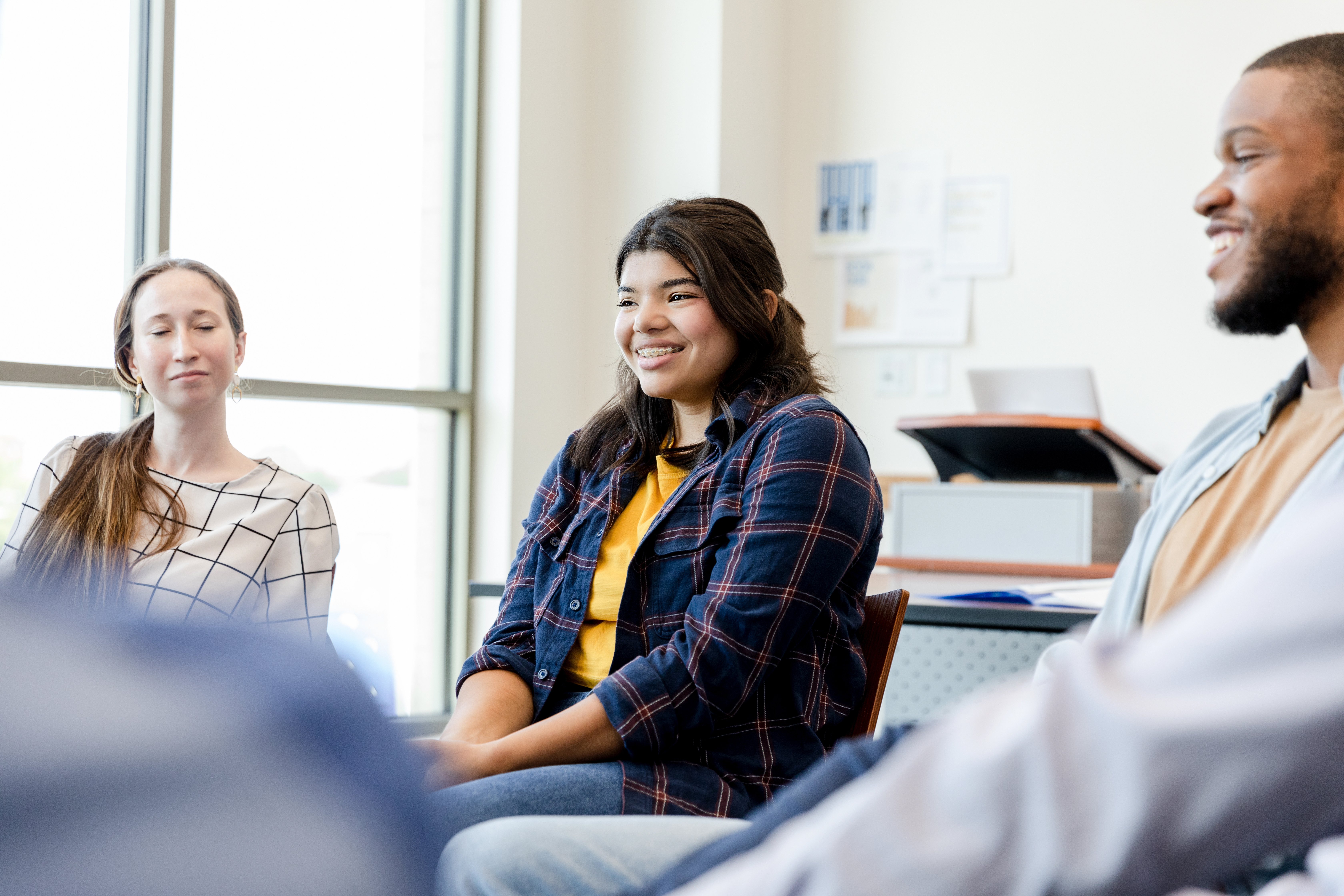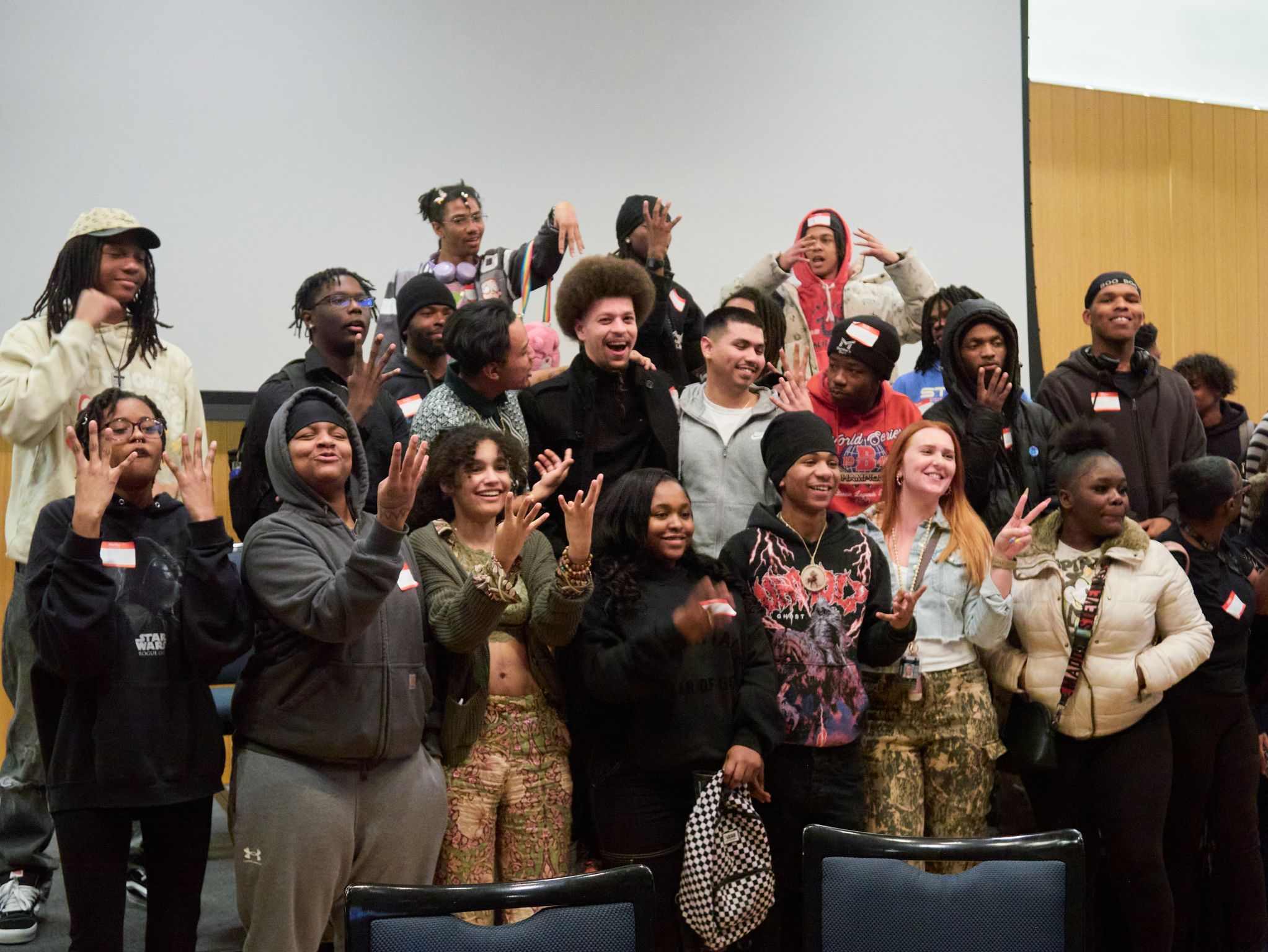Blog
Embracing Young People’s Capacity to Lead
In February, The Biden-Harris Administration brought together nearly 90 young people from across the nation for the first-ever interagency Youth Policy Summit: Cultivating Possibilities. The summit was organized in partnership with youth, and provided policymakers from federal agencies an opportunity to hear directly from young people about how to improve policies and programs to encourage youth thriving.
 Search Institute’s Senior Director of Research, Dr. Joanna Williams, attended the summit and participated in a panel discussion, "Plenary on Research, Evidence, and Storytelling: Storytelling as Evidence." The discussion was motivated by the question, "What happens when research is done without attention to equity vs. with it?"
Search Institute’s Senior Director of Research, Dr. Joanna Williams, attended the summit and participated in a panel discussion, "Plenary on Research, Evidence, and Storytelling: Storytelling as Evidence." The discussion was motivated by the question, "What happens when research is done without attention to equity vs. with it?"
Thriving and Equity
A fundamental assumption of positive youth development is that all young people have the capacity to thrive. All youth possess strengths, and when those strengths are supported and nourished by assets in communities and developmental relationships, they are more likely to thrive.
Imagine what might be possible if we collectively embraced this belief in the capacity of youth? The organizers of the Youth Policy Summit: Cultivating Possibilities centered that idea— and the young people from around the country shared their visions for a just world where their ideas are respected and acted upon.
A Seat at the Table
Fireside chats between young people and agency leaders, including Department of Education Secretary Miguel Cardona, Department of Health and Human Services Secretary Xavier Becerra, and acting Department of Labor Secretary Julie Su were a highlight.
Young people from YR Media, the Justice and Joy National Collaborative, and the National Youth Employment Coalition offered insights into ways that agencies and systems can align to better meet the needs of youth and their communities. The young people asked questions and proposed solutions that pushed leaders to think critically about policy gaps and opportunities.
The summit offered a glimpse of what it can look like for adults to share power and expand possibilities with and for young people. These are critical elements of developmental relationships, close connections through which young people discover who they are, cultivate abilities to shape their own lives, and learn how to engage with and contribute to the world around them.
Search Institute’s Developmental Relationships Framework identifies five strategies to strengthen and deepen the relationships that help young people thrive.
The recent summit is a shining example of two key strategies: share power and expand possibilities.
Sharing Power
The essence of sharing power is treating young people with respect and giving them a say. It requires a commitment to inclusion and collaboration, and to letting young people lead. When we share power with young people, we
- Respect them by taking them seriously and treating them fairly
- Involve them in decision that affect their lives
- Collaborate with them to solve problems and reach goals
- Let them lead by creating opportunities for them to take action and lead
There are approaches to sharing power that practitioners and leaders can use in classrooms, programs, and informal settings. For example, we can encourage choice by letting them pick partners, groups, or activities; decide how to spend free time; or select topics. Encouraging voice means inviting young people to share thoughts and opinions and reminding them that their voices are important in and beyond the classroom or program.
Expanding Possibilities
To expand possibilities means connecting youth with people and places that broaden their world. For example, we can
- Inspire them to see possibilities in their future
- Broaden their horizons by exposing them to new ideas, experiences, and places
- Connect them by introducing them to people who can help them grow
Approaches to expanding possibility include using culturally responsive content, introducing options, and helping them go deeper into subjects or interests that engage and energize them.
When we share power and expand possibilities with young people, they are better able to develop their abilities and resources to shape their lives and communities.
A Critical Need
Unfortunately, our research shows that “share power” and “expand possibilities” are the least commonly experienced elements of developmental relationships. For example, 40-49% of young people say their school and youth program staff connect them, include them, broaden their horizons, or let them lead only “a little” or “somewhat.”
As a point of comparison, only 10-19% of the same youth say adults expect their best, set boundaries, or hold them accountable “a little” or “somewhat.”
Relationships that expand possibilities and share power are an important means for building connections that facilitate access to educational and occupational resources and for meeting young people’s developmental needs.
Opportunities to explore, make decisions, and contribute are essential for the development of agency, identity, sense of purpose, and well-being. These opportunities can also foster a sense of belonging, which supports positive mental health and school engagement, and strengthens pathways to future education and employment as youth transition into adulthood.
A Perception Gap
Unfortunately, many adults believe they are sharing power and expanding possibilities, but the young people they serve do not share their perceptions. For instance, about 85% of school and youth program staff reported sharing power compared to 63% of youth in those settings.
Similarly, 73% of adults believed they were expanding possibilities, compared to 51% of youth (Houltberg, Scales, & Williams, 2023). Adults acknowledge several barriers to fostering strong developmental relationships, from different lived experiences to systemic inequalities. Some also note challenges in sharing power .
A Youth-Powered Future
The interagency Youth Policy Summit offered an incredible platform for modeling what it looks like to share power and expand possibilities.
It is exciting to imagine the new policy ideas and partnerships that will be supported by investments from the Funders for Adolescent Science Translation, a group committed to including young people in the work of advancing federal youth policy.
National Events like the Youth Policy Summit can galvanize classrooms, programs, and communities to do a better job of empowering young people and centering youth voices.
Many excellent tools are available for exploring and deepening these practices. Search Institute’s Student Voice Toolkit is designed to support educators in measuring and advancing practices that support youth voice.
We believe in the capacity of young people to learn, grow, and shape their world. We can play our role by sharing power and expanding possibilities in ways that will help them recognize and claim their power to embrace their futures.





